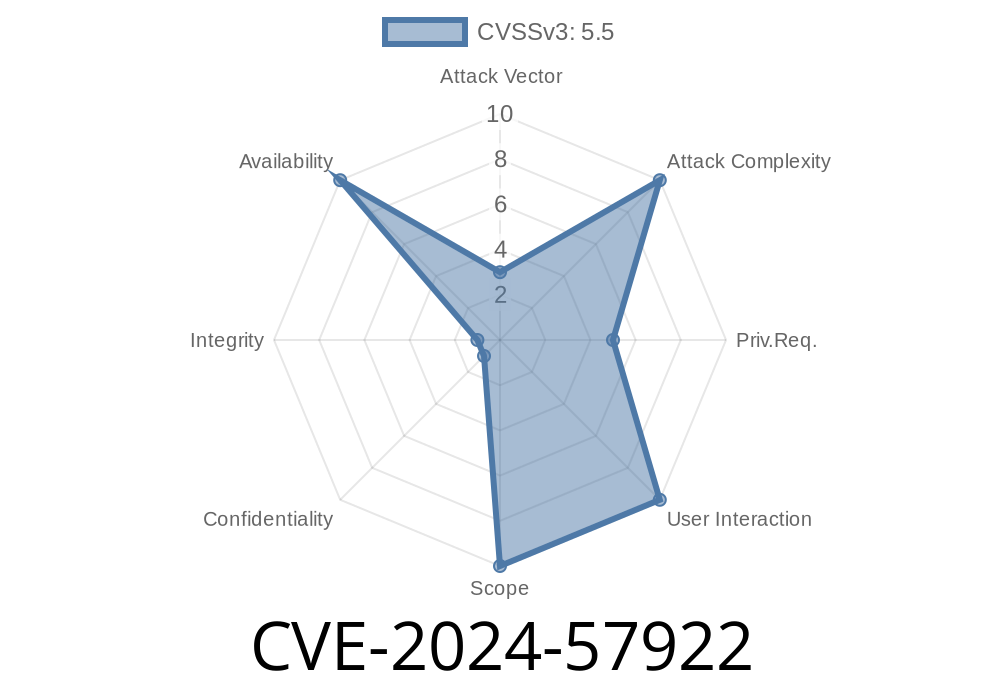The Linux kernel—a key piece of the world's servers, desktops, and even your Android phone—sometimes faces bugs that can introduce risk or cause crashes. In this deep dive, we’ll break down CVE-2024-57922, a vulnerability involving AMD display drivers in the Linux kernel, understand how it happened, show you code snippets, and discuss the exploit potential in plain, accessible language.
What is CVE-2024-57922?
CVE-2024-57922 is a vulnerability found in the Linux kernel’s DRM (Direct Rendering Manager) code for AMD GPUs. Specifically, it relates to how certain helper functions handle display calculations, such as bandwidth allocation. The root cause is a missing check for a variable (called granularity) being zero. This leads to the possibility of a divide-by-zero crash or unexpected behavior, opening the door for system instability and potentially denial of service.
Technical Deep Dive: How Did This Happen?
When the Linux kernel’s AMD display code needs to round numbers for things like bandwidth (BW) calculations, it uses two helper functions: dcn_bw_ceil2() and dcn_bw_floor2(). These helpers take a value and “snap” it up or down to match a step size (granularity), like rounding up to the next multiple of 8.
Originally, the code did not check if the granularity value was zero. If some mistake or bug further along (or bad input) made granularity zero, this would hit a fatal divide by zero in the helpers.
Here’s a simple idea in code
unsigned int dcn_bw_ceil2(unsigned int value, unsigned int granularity)
{
return ((value + granularity - 1) / granularity) * granularity;
}
Now, imagine if granularity == . The code would divide by zero (/ granularity), causing a kernel crash.
The fix is to check if granularity is zero before using it
unsigned int dcn_bw_ceil2(unsigned int value, unsigned int granularity)
{
if (granularity == )
return value; // or handle error more safely
return ((value + granularity - 1) / granularity) * granularity;
}
This change stops a divide-by-zero at the source, avoiding a kernel panic. This fix has already been integrated into recent upstream kernels.
Reference:
AMD display crash on granularity zero - Patch on Kernel.org
How Bad Is This Vulnerability?
- Impact: If untrusted, buggy, or malicious applications can trigger these functions with granularity zero—directly or indirectly—they can crash the Linux system. This is mainly a local Denial of Service (DoS) risk.
- Who’s Affected: Systems with AMD GPUs running Linux kernels before this fix, which is part of the AMD display code.
- Exploitability: Practical exploitation depends on whether there is a path from user space (regular programs) to these helper functions with attacker-controlled values. In most setups, only advanced users, developers, or those crafting custom display timings/settings would be at risk.
Proof-Of-Concept (PoC) Outline
While a simple, safe reproduction is unlikely without writing kernel modules or poking through obscure user space APIs, here's how a hypothetical exploit could look:
PoC Idea (NOT standalone code)
1. Find a way (via exposed DRM IOCTLs or debugging tools) to influence display bandwidth calculation routines in the AMD display driver.
Example (In Kernel, for learning—do NOT run on production systems)
// Dangerous code for test kernel module
#include <linux/module.h>
static int __init exploit_init(void)
{
unsigned int result;
result = dcn_bw_ceil2(100, ); // This would trigger the bug prior to fix
printk("Result: %u\n", result);
return ;
}
static void __exit exploit_exit(void)
{
printk("Module out\n");
}
module_init(exploit_init);
module_exit(exploit_exit);
MODULE_LICENSE("GPL");
Warning: Running deliberately buggy code can crash or brick your system. This is for educational illustration only.
What Should You Do?
- Upgrade your Kernel: If you run Linux with AMD graphics and use the latest display stack, update your kernel. Many distributions will have this fix applied as of June 2024.
- Mitigation: If you can't upgrade, avoid using experimental display modes or tools which tweak AMD GPU settings until you can.
References for Further Reading
- NVD CVE-2024-57922 Entry
- Upstream discussion and fix on Kernel.org
- AMD Linux Kernel display code (documentation)
- Divide-by-zero Wikipedia
Conclusion
CVE-2024-57922 is a good reminder that even tiny code slips (like an unchecked division) can crash the most powerful systems. The fix is quick, the exploitability is low for most, but updating is always smart. The open-source community and Linux developers moved swiftly, and your system is safer for it!
Stay patched—and keep your eye on those display drivers!
Timeline
Published on: 01/19/2025 12:15:26 UTC
Last modified on: 02/27/2025 21:59:28 UTC
